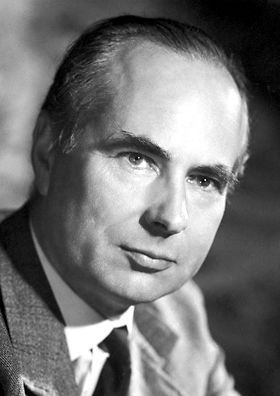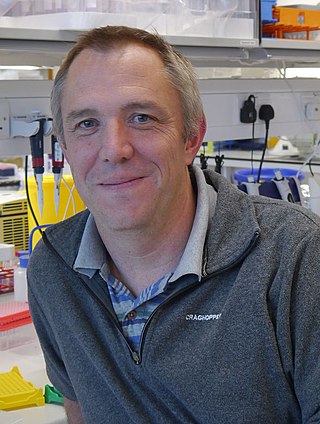Related Research Articles

Sir Andrew Fielding Huxley was an English physiologist and biophysicist. He was born into the prominent Huxley family. After leaving Westminster School in central London, he went to Trinity College, Cambridge, on a scholarship, after which he joined Alan Hodgkin to study nerve impulses. Their eventual discovery of the basis for propagation of nerve impulses earned them the Nobel Prize in Physiology or Medicine in 1963. They made their discovery from the giant axon of the Atlantic squid. Soon after the outbreak of the Second World War, Huxley was recruited by the British Anti-Aircraft Command and later transferred to the Admiralty. After the war he resumed research at the University of Cambridge, where he developed interference microscopy that would be suitable for studying muscle fibres.

The Royal Society of Chemistry (RSC) is a learned society and professional association in the United Kingdom with the goal of "advancing the chemical sciences". It was formed in 1980 from the amalgamation of the Chemical Society, the Royal Institute of Chemistry, the Faraday Society, and the Society for Analytical Chemistry with a new Royal Charter and the dual role of learned society and professional body. At its inception, the Society had a combined membership of 34,000 in the UK and a further 8,000 abroad.

Fellowship of the Royal Society is an award granted by the Fellows of the Royal Society of London to individuals who have made a "substantial contribution to the improvement of natural knowledge, including mathematics, engineering science, and medical science".

Kwame Akroma-Ampim Kusi Anthony Appiah is a British-American philosopher and writer who has written about political philosophy, ethics, the philosophy of language and mind, and African intellectual history. Appiah is Professor of Philosophy and Law at New York University, where he joined the faculty in 2014. He was previously the Laurance S. Rockefeller University Professor of Philosophy at Princeton University. Appiah was elected President of the American Academy of Arts and Letters in January 2022.

Richard S. Sutton is a Canadian computer scientist. He is a professor of computing science at the University of Alberta and a research scientist at Keen Technologies. Sutton is considered one of the founders of modern computational reinforcement learning, having several significant contributions to the field, including temporal difference learning and policy gradient methods.

Sir David Charles Baulcombe is a British plant scientist and geneticist. As of October 2024 he was Head of Group, Gene Expression, in the Department of Plant Sciences at the University of Cambridge, and the Edward Penley Abraham Royal Society Research Professor and Regius Professor of Botany Emeritus at Cambridge. He held the Regius botany chair in that department from 2007 to 2020.
The Harrison-Meldola Memorial Prizes are annual prizes awarded by Royal Society of Chemistry to chemists in Britain who are 34 years of age or below. The prize is given to scientist who demonstrate the most meritorious and promising original investigations in chemistry and published results of those investigations. There are 3 prizes given every year, each winning £5000 and a medal. Candidates are not permitted to nominate themselves.
Donal Donat Conor Bradley is the Vice President for Research at King Abdullah University of Science and Technology (KAUST), Saudi Arabia. From 2015 until 2019, he was head of the Mathematical, Physical and Life Sciences Division of the University of Oxford and a Professor of Engineering Science and Physics at Jesus College, Oxford. From 2006 to 2015, he was the Lee-Lucas Professor of Experimental Physics at Imperial College London. He was the founding director of the Centre for Plastic Electronics and served as vice-provost for research at the college.
Joseph Anthony Movshon ForMemRS is an American neuroscientist. He has made contributions to the understanding of the brain mechanisms that represent the form and motion of objects, and the way these mechanisms contribute to perceptual judgments and visually guided movement. He is a founding co-editor of the Annual Review of Vision Science.

Dame Molly Morag Stevens is the John Black Professor of Bionanoscience at the University of Oxford's Department of Physiology, Anatomy & Genetics. She is Deputy Director of the Kavli Institute for Nanoscience Discovery and a member of the Department for Engineering Science and the Institute for Biomedical Engineering.
The Fellowship of the Academy of Social Sciences (FAcSS) is an award granted by the Academy of Social Sciences to leading academics, policy-makers, and practitioners of the social sciences.
The Royal Society University Research Fellowship (URF) is a research fellowship awarded to outstanding early career scientists in the United Kingdom who are judged by the Royal Society to have the potential to become leaders in their field. The research fellowship funds all areas of research in natural science including life sciences, physical sciences and engineering, but excluding clinical medicine.

Andrew P. Carter is a British structural biologist who works at the Medical Research Council (MRC) Laboratory of Molecular Biology (LMB) in Cambridge, UK. He is known for his work on the microtubule motor dynein.
References
- ↑ "Outstanding scientists elected as Fellows of the Royal Society | Royal Society". royalsociety.org. Retrieved 2024-05-16.
- 1 2 3 4 5 6 7 8 "Nine Oxford scientists elected as Royal Society Fellows | University of Oxford". www.ox.ac.uk. 2024-05-16. Retrieved 2024-05-16.
- 1 2 3 4 5 6 7 8 9 10 "Ten Cambridge scientists elected as Fellows of the Royal Society 2024". University of Cambridge. 2024-05-16. Retrieved 2024-05-16.
- 1 2 3 4 5 6 7 "Seven Imperial scientists elected as Fellows of the Royal Society | Imperial News | Imperial College London". Imperial News. 2024-05-16. Retrieved 2024-05-16.
- ↑ Dublin, Trinity College. "Professor Dan Bradley elected Fellow of the Royal Society". www.tcd.ie. Retrieved 2024-05-16.
- 1 2 "Outstanding John Innes Centre scientists elected as Fellows of the Royal Society". John Innes Centre. 2024-05-16. Retrieved 2024-05-16.
- 1 2 "Two outstanding Strathclyders elected as Fellows of the Royal Society | University of Strathclyde". www.strath.ac.uk. Retrieved 2024-05-16.
- ↑ "Appiah and Movshon elected to the Royal Society" – via NYU.